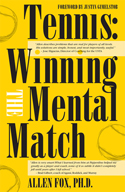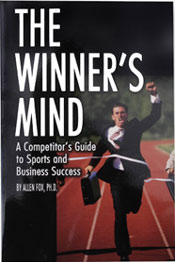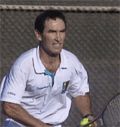Playing the Greats:
Arthur Ashe
By Allen Fox, Ph.D.
 |
Physical talent, logic, and willpower made Ashe a champion.
|
There is little doubt that Arthur Ashe was a fantastic physical talent but it was his strength of character and his ability to overcome emotional difficulties with logic and sheer willpower that made him a champion.
I first met Arthur Ashe at UCLA where I was a graduate student and he was an in incoming freshman. He was a highly ranked junior but not the best junior in the country, that honor falling to Charlie Pasarell, his freshman teammate.
Arthur was friendly off court, he appeared relaxed, smiled and laughed a lot, and was amiable and chatty. But on court, he was cool, reserved, aloof, almost casual, and displayed a well-controlled temper. Unusual as it may be, I can not recall Arthur EVER getting angry on a tennis court, either in matches or in practice.
I can not claim that I had the same level of control even though I was four years Arthur's senior. Charlie Pasarell and I were screaming and yelling so much in our practice matches our coach threatened to ban us from ever practicing together again.
In his early years, Arthur had a tendency to become discouraged and quit when he got behind, causing him to lose matches he might have won. I played and beat him a half dozen times his first couple of years at UCLA, mainly by hustling and forcing him to bear down on each point so he would mentally tire.
|
Arthur was wonderful with his hands and could do anything with the ball.
|
I couldn't match his variety of shots and power, but I could hang with Arthur until he emotionally weakened. I learned if I fought hard enough and long enough he would ultimately become disheartened, make mistakes, and hand me the match. It was really the only way I could beat him and it worked quite well when Arthur was young and inexperienced.
But Arthur was unusual in overcoming this emotional difficulty with character and discipline, and so became a great player in spite of it. And that was unfortunate for me because when Arthur matured he gave me a couple of the worst beatings I had ever experienced. He simply figured out getting discouraged was not a good idea and stopped doing it.
In his early twenties, Arthur toughened up quite a bit and by the end of his career he could hang in matches very well. He generally did not hang as tough as the truly great players like Laver, Gonzales, Connors, etc., but he was tough enough to win a couple of Slam events, so he certainly became pretty tough.
 |
By the end of his career, Ashe was tough enough to defeat Connors in the final at Wimbledon. |
The lesson to be learned from Arthur is that people can change emotional habits, just like physical habits. Emotional maturity, combined with his great physical talent, allowed him to become a champion.
Arthur was very hard to play against. In fact he was downright unpleasant across the net. His most fearsome weapon was his first serve. It was a very relaxed, effortless delivery, not terribly powerful, but hit flat and with incredible deception.
I used to stand there watching it go by again and again. He liked hitting it to the forehand side, wide in the deuce court and down the middle in the ad court. I knew this, but for the life of me I could never see it coming. Worse yet, he was exceptionally good at acing you on the big points.
In particular if you held 30 - 40, you were in grave danger. In those days there were a number of big servers that could make your life miserable on the grass surface where most big matches were held, but not one of them could ace you as easily and often as Arthur.
Arthur's second serve, by contrast, was relatively weak. He hit it with more slice than topspin and it was light and easy to return. Arthur followed both of his serves to the net, but since he was neither a great volleyer nor exceptionally fast on his feet, he was quite vulnerable on his second serve.
If you were able to hit a solid, low return you had a good chance to pass Arthur on the next shot. Unfortunately for his opponents this weakness was usually not enough to offset the incredible strength of his first serve so. On balance, it was very difficult to break Arthur's serve.
Arthur usually used topspin on both his forehand and backhand groundstrokes, following a new trend in the game set by Rod Laver. Like Laver, Arthur was wonderfully gifted with his hands and could do virtually anything with the ball.
He could hit any ball into any place in the court without indication, particularly with his backhand, which was his better side. He varied his shots continually, rarely hitting two of the same shots in a row.
He would mix in slices, topspins, drop shots, flat balls, and topspin lobs randomly and effortlessly. As his opponent you never new what was coming next and were perpetually off balance.
This made it very difficult to play well against Arthur, and you found yourself missing shots you normally made because you were so often surprised by his choice of shot and placement. On the other hand Arthur also made a lot of mistakes himself and this was his undoing against the very best.
In assessing Arthur's greatness as a player we must first take note of the fact that he won the US Open and Wimbledon (defeating Jimmy Connors at his peak in 1975). These wins make it obvious that when playing well he was awfully good but he was not a dominating player and was never the best player in the world for an entire year.
On a head to head basis he was not nearly as good as the truly great players of his time like Ken Rosewall, Pancho Gonzales, Roy Emerson, Manuel Santana, or Rod Laver. These players could and did beat him regularly.
 |
His second serve and other weaknesses meant Arthur could not regularly overcome
the greatest players of his day. |
He was not quite as good as John Newcombe or Stan Smith either, although he could certainly hold his own against them, but he was better than Fred Stolle who also won the US Championship during this time period.
Arthur just had a few too many weaknesses in his game to overcome the very best players day in and day out over a prolonged period of time. But his greatness lay in his ability to take advantage of opportunities and win the two most important tournaments in the world.
Although he didn't show it, Arthur used to get very nervous, and before important matches, his stomach would be in knots. We played doubles together at Wimbledon in 1963. In what was the first trip to Europe for both of us, we choked like dogs against the Russians on center court.
The Russians were as nervous as we were and the tennis was so bad spectators were fighting to get out and watch the matches on the back courts. I was even hoping the Russians would hit some good shots so the people would stick around.
Arthur served for the first set. On the first point the Russians floated back a high, soft return and I waited for Arthur to charge in on top of the net and knock it off but he never showed up. He was so nervous he only managed to take two steps inside the baseline and hit a swing volley that went into the back fence (of course I should have poached but I was also paralyzed).
 |
Ashe's greatness was taking his opportunities to win the two most important tournaments in the world. |
We went on to drop that game as well as the match. Arthur later learned to control his nerves but the inner man was certainly not the cool, emotionless person spectators saw. It took great effort, discipline, and will for Arthur to appear so casual and relaxed.
A great deal has been said and written about Arthur's generous nature and his devotion to his community and principles. I almost feel silly adding to this legend because after a person dies there is often a tendency to endow them with golden traits that bear only small resemblance to reality. Arthur has, in fact, been deified. On the other hand I knew him as person and a friend, and it is hard for me to think of him as a God even though he was as close to being one as anyone I have ever known.
I personally witnessed one of his acts of selflessness that illustrates the kind of person Arthur was. In 1969 tennis had just become an open game. Prior to that time we all played as amateurs and nobody made substantial money. We were paid a few dollars here and there but played mainly for the love of competition, the travel, and the camaraderie and fun of the circuit.
But times were changing, now all the major tournaments were professional, and players could get paid significantly for exhibitions, and equipment companies could legitimately pay for product endorsements. Arthur happened to have just won the US Open and was the hottest player in the game.
Lamar Hunt, an extremely wealthy Texas tennis enthusiast, began guaranteeing top players large sums of money to sign contracts with him and obligate themselves to play events under his control (his tennis entity was called World Championship Tennis, WCT.)
He put together a group, called "the handsome eight" which included players like Emerson, Tony Roche, Dennis Ralston, Cliff Drysdale, and others, and he very much wanted Arthur to join.
 |
Arthur didn't hesitate in choosing friendship and principle over money. |
With his almost unlimited capital, Lamar decided to take over, build, and run the fledgling game of open, professional tennis. And since he had bought up almost all the big names in the game, he was in an excellent position to do so. Arthur would have been the last and most flashy jewel in his crown.
So he offered Arthur an enormous sum of money to join, an amount so large that Arthur would have had no worries about money thereafter. Since Arthur had no money at all, this had to be very tempting.
But at the same time Arthur's close friends Donald Dell and Charlie Pasarell wanted to start a company they hoped would become an alternative force in directing the development of the new open game. They needed Arthur to give the company power. They could not offer him money or any guarantees for the future.
Here he faced significant risks. If Arthur had become injured and unable to play he would have been out of luck. If the new open game did not develop and prize money and endorsement money did not grow, Arthur would have remained impoverished.
All Donald and Charlie offered Arthur was friendship and a chance to be a force for good in the developing game. Lamar Hunt, on the other hand, was offering guaranteed financial security for life. Now, I love my friends and feel I have high principles, but FINANCIAL SECURITY FOR LIFE? That is unfairly tempting. I happened to be present at some of the meetings where the positions were presented to Arthur and personally watched him choose friendship and principle over money. He didn't even hesitate. That was Arthur Ashe.






